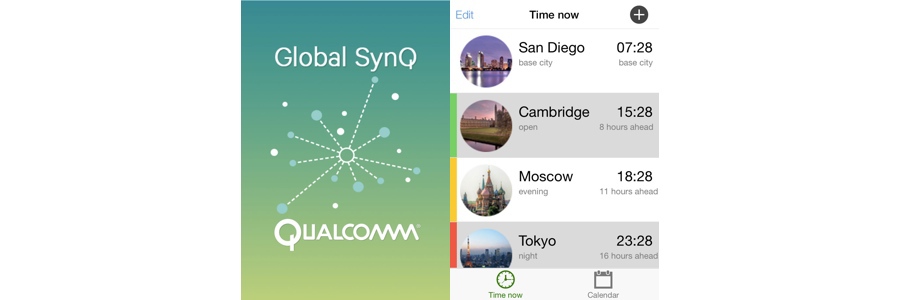
Case Studies
GlobalSynQ reduces the pain of international meetings
by Geoff Stead

We’ve all been there. Stuck in a multi-national conference with some poor person calling in at 2am in their pyjamas.
GlobalSynQ is a new Qualcomm app that helps employees act smarter, and limit the number of pyjama incidents!
The idea for GlobalSynQ started in our India Office. Colleagues there were finding that none of the usual office calendaring tools were good enough to help them understand the subtleties of exactly how late in the day was it appropriate to call Denmark. Or New York. Or California. Local cultural norms vary greatly. Add to this the complexity of differing national and regional holidays, and it gets even harder to prevent the pyjama incident.
Did you know that:
- India has different public holidays in each region?
- In Europe, most companies are closed for all public holidays, whereas in the US, individual companies decide their own calendar
- In Denmark, a working week is 37 hours, whereas in Thailand it could be 48!
- Israeli weekends start on Friday. Some Moslem countries start on Thursday, and are back at work on Saturday!
Global SynQ is a lightweight web app that lets you select multiple qualcomm offices around the world, then compare opening hours in each. It has two views:
- Time now: See the local times at all the selected offices, with any special holidays highlighted.
- Calendar: For any given day, see a color-coded timeline of how the different offices compare, to help you find the optimum meeting time that balances the inconvenience better for all attendees. This includes fixed facts like “opening hours”, and “office holidays”, as well as the more subtle “which hours outside of work are still reasonably agreeable for this office”.
We have launched the app in the past month and the feedback has been overwhelmingly positive. We believe Global SynQ hits the chords with our employees for two fundamental reasons:
- It is personal: employees select their own office location and other offices they regularly do business with.
- It is customized: the information for office holidays and available cities are not generic information but customized data that came from Qualcomm’s internal systems, but is being shared globally in this new, user-centric way.
See GlobalSynQ in action, below:
There are other tools available online to show the time differences between locations and even a tweak in Outlook settings to add national holidays for multiple countries to your calendar. However, we found that customizing directly for our organization really helped turn this into a more productive tool for our employees.
What do you think? Would Global SynQ help you in dealing with arranging meetings with global offices? Any other suggestions or tools you already use to do so? Share in the comments…